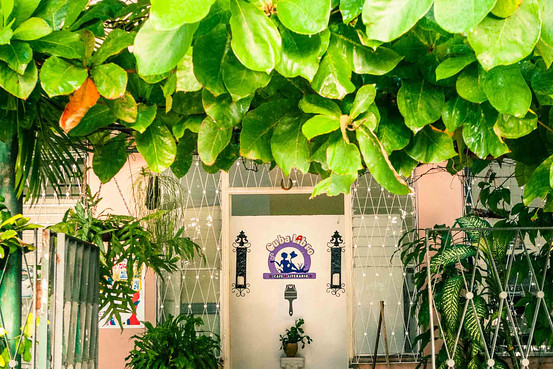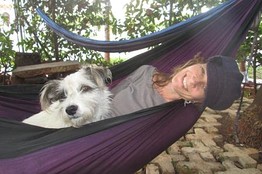
Cuban ‘Aplatanada’ records her non-expat life in Havana
For Conner Gorry, there’s the image of Cuba that is portrayed in the press, and the Cuba that she has known and loved since she moved to the country in 2002.
The U.S.-born expat writes about Cuba from her home in Havana, where she covers health issues, travel, and daily life in Cuba. Her blog, “Here is Havana,” is, as she describes it, “navel-gazing, cathartic venting at its best and worst. If you’ve ever wondered what it’s like to kiss on the Malecon, go to the doctor for free, smoke tasty 5-cent cigars, or forgo toilet paper, welcome to Havana.”
In 2013 she opened Cuba Libro, the only English-language bookstore in the country. More recently, she finished an as-yet unpublished book on her life in Cuba.
In December, Presidents Barack Obama and Raul Castro announced that both countries would begin to seek normalized relations, including a possible end to the 54-year embargo and even the re-opening of the American embassy in Havana.
Ms. Gorry talked to WSJ Expat contributor Debra Bruno by Skype and also answered questions by email when the Skype connection cut out. Edited remarks follow:

How did you get to Cuba in the first place?
I first came in 1993. I was doing a Master’s in political science and I wrote a thesis on the U.S. embargo. I volunteered for a month with Cubans in the field, and it was a transformational experience, as many are. It was a special period with 16-hour blackouts, and adults losing 15 to 20 pounds. But still I found people studying, doing research, conducting surveys. I was fascinated by how such privation affected a society and they could still truck along and stay afloat. I didn’t come back for eight years, and then in 2001, I fell in love with a Cuban, moved here, and married him.
Can you describe your bookstore?
I’m the co-founder of Cuba Libro (Cuba Book). It was conceived as an ethically and socially responsible business. Cubans can hang out, and they don’t have to buy anything. We have community projects and we’re committed to HIV-prevention so we distribute free condoms. Also at Cuba Libro we receive people-to-people groups three or four times a week so people can meet Cubans, learn about private enterprise.
What’s your memoir about?
There are not many people from the U.S. who’ve had a front-row seat to see the continuum, the evolution. Cuba has been changing all along, but no one’s been paying attention. So the book is basically on the changes over the past 13 years I’ve lived here interspersed with chapters on what it’s like living through the changes and adjusting. It’s also about a cross-cultural love, and learning to speak “Cuban,” which is different from regular Spanish.

You talk in your blog about the myths people have about Cuba. What are some of them?
One is that there’s a currency for tourists and a currency for locals. That’s completely wrong.
Another myth?
That Cuba is a police state. I always say to people who come here for the first time: write down your expectations. What are you going to see, smell, expect, and then when you’re here, write them down again. It’s a really interesting exercise in how deeply rooted the propaganda is.
Anything else?
Another big myth is the connectivity of Cubans. The World Bank pegs internet connections at 5 percent of the population. That is a complete misunderstanding of how Cubans connect and share connections. It’s only taking the official number of how many people open Internet accounts. But Cubans share everything, and that includes Internet connectivity. When I moved here, no one had cell phones, no one had iPods, I didn’t even have a land line in my house. And now, people come here and say, ‘Oh my God, people have iPhones!’
You’ve said you don’t consider yourself an expat. Why is that?
For me, expat is a loaded, outmoded term. It suggests abandoning or forsaking one land for another and minimizes where one chooses to live, placing, instead, the emphasis on where one chooses not to. I much prefer the Cuban concept of aplatanada – literally, planted – applied to long-term, full-time foreign residents who get this place.
What was it like when you first got to Cuba?
My first apartment here was in one of those cookie-cutter Soviet-style apartment blocks on the far outskirts of Havana: no hot water, no phone, no paint on the walls, no toilet seat, infested with termites to the point that the bed collapsed periodically and you could stick your thumb through the front door. Five generations of neighbors living in a two-bedroom apartment. My husband and I lived there for six years and it thrust me into the Cuban reality, warts and all.
Do you interact with expats?
When I opened Cuba Libro in 2013, I was introduced to a whole new world – a foreigner world, where most resident foreigners don’t speak Spanish – at least not Cuban Spanish – have never been on a bus, drive to the best-stocked grocery stores and don’t have to rely on what’s available in the immediate neighborhood, are not used to kissing hello and goodbye to everyone, haven’t had to stand on line to buy bread or cabbage or to use a public phone, have never had their shoes repaired by the local zapatero, and don’t clean their own houses. Many also have few Cuban friends – instead, they have Cuban staff.
They probably work in a joint venture, at an embassy or international NGO, or not at all: they’re living off an inheritance or their retirement. This isn’t to say all foreigners here fit this mold, but it applies to the majority I’ve met and is part of the reason why I don’t consider myself an expat.
Do you get a chance to visit the U.S.?
It’s a matter of money. The 40-minute flight from Havana to Miami costs $400 and then I have to get to New York City, where most of my friends and all of my family are located. All told, each trip, just for the flights, taxes, and fees, costs $800 or more. So when I have the money, I go.
Anything you miss?
Each time I’m up there, I realize how much I don’t miss about the USA – there’s so much homelessness, the most vulnerable are disregarded or discarded, most people are too busy or distracted to make time to spend time with the people they love, the political system is a corruptive mess, the racial inequality and segregation, the class divide, the wars.
Don’t get me wrong: there’s no perfect system and Cuba is far from perfect. The point is, no matter where one chooses to live, you have to take the good with the bad, and when I visit the States, I just can’t live with all the bad I see going on there. I miss people rather than things in the USA – although I do envy your broadband Internet.
(From: The Wall Street Journal)


